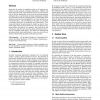Free Online Productivity Tools
i2Speak
i2Symbol
i2OCR
iTex2Img
iWeb2Print
iWeb2Shot
i2Type
iPdf2Split
iPdf2Merge
i2Bopomofo
i2Arabic
i2Style
i2Image
i2PDF
iLatex2Rtf
Sci2ools
116
click to vote
SMA
2008
ACM
2008
ACM
Streaming tetrahedral mesh optimization
Improving the quality of tetrahedral meshes is an important operation in many scientific computing applications. Meshes with badly shaped elements impact both the accuracy and convergence time of scientific applications. State-of-the-art mesh improvement techniques rely on sophisticated numerical optimization methods such as feasible Newton or conjugate gradient. Unfortunately, these methods cannot be practically applied to very large meshes due to their global nature. Our contribution in this paper is to describe a streaming framework for tetrahedral mesh optimization. This framework enables the optimization of meshes an order of magnitude larger than previously feasible ones and can effectively optimize meshes too large to fit in memory. Our results show that streaming is typically faster than the global optimization and results in comparable mesh quality. This leads us to conclude that streaming extends mesh optimization to a new class of mesh sizes without compromising the quality...
Related Content
| Added | 15 Dec 2010 |
| Updated | 15 Dec 2010 |
| Type | Journal |
| Year | 2008 |
| Where | SMA |
| Authors | Tian Xia, Eric Shaffer |
Comments (0)

